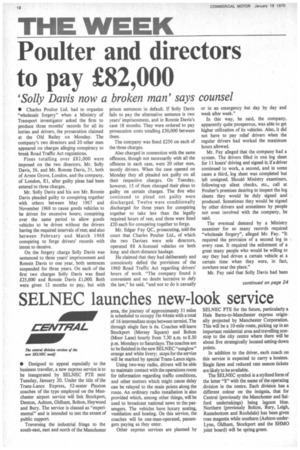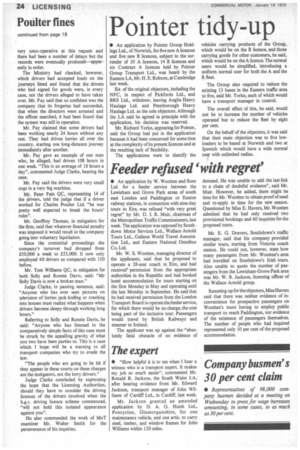Poulter and directors to pay £82,000
Page 20

Page 26

If you've noticed an error in this article please click here to report it so we can fix it.
Solly Davis now a broken man' says counsel
• Charles Poulter Ltd. had to organize "wholesale forgery" when a Ministry of Transport investigator asked the firm to produce three months' records for all its lorries and drivers, the prosecution claimed at the Old Bailey on Monday. The company's two directors and 20 other men appeared on charges alleging conspiracy to break Road Traffic Act regulations.
Fines totalling over £82,000 were imposed on the two directors, Mr. Solly Davis, 56, and Mr. Ronnie Davis, 31, both of Amos Grove, London, and the company, of London, El, after guilty pleas had been entered to three charges.
Mr. Solly Davis and his son Mr. Ronnie Davis pleaded guilty to conspiring together with others between May 1967 and November 1968 to cause goods vehicles to be driven for excessive hours; conspiring over the same period to allow goods vehicles to be driven without the drivers having the required intervals of rest; and also between February and March 1968 conspiring to forge drivers' records with intent to deceive.
On the forgery charge Solly Davis was sentenced to three years' imprisonment and Ronnie Davis to one year, both sentences suspended for three years. On each of the first two charges Sony Davis was fined £25,000 and Ronnie Davis £1,000. Both were given 12 months to pay, but with prison sentences in default. If Solly Davis fails to pay the alternative sentence is two years' imprisonment, and in Ronnie Davis's case 18 months. They were ordered to pay prosecution costs totalling £30,000 between them.
The company was fined £250 on each of the three charges.
Also charged in connection with the same offences, though not necessarily with all the offences in each case, were 20 other men, mostly drivers. When the case opened on Monday they all pleaded not guilty on all their respective charges. On Tuesday, however, 15 of them changed their pleas to guilty on certain charges. The five who continued to plead not guilty were discharged. Twelve were conditionally discharged for three years for conspiring together to take less than the legally required hours of rest, and three were fined £20 each for conspiring together to forge.
Mr. Edgar Fay QC, prosecuting, told the court that Charles Poulter Ltd., of which the two Davises were sole directors, operated 88 A-licensed vehicles on both longand short-distance haulage.
He claimed that they had deliberately and consciously defied the provisions of the 1960 Road Traffic Act regarding drivers' hours of work. "The company found it convenient and no doubt lucrative to defy the law," he said, "and not to do it casually or in an emergency but day by day and week after week."
In this way, he said, the company, apparently quite prosperous, was able to get higher utilization of its vehicles. Also, it did not have to pay relief drivers when the regular drivers had worked the maximum hours allowed.
Mr. Fay alleged that the company had a system. The drivers filled in one log sheet for 11 hours' driving and signed it; if a driver continued to work, a second, and in some cases a third, log sheet was completed but left unsigned. Should Ministry examiners, following-up silent checks, etc., call at Poulter's premises desiring to inspect the log sheets they would be duly signed and produced. Sometimes they would be signed by other drivers and sometimes by people not even involved with the company, he said.
The eventual demand by a Ministry examiner for so many records required "wholesale forgery", alleged Mr. Fay. "It required the provision of a second log in every case. It required the enlistment of a great many people who would be willing to say they had driven a certain vehicle at a certain time when they were, in fact, nowhere near the place."
Mr. Fay said that Softy Davis had been very unco-operative at this request and there had been a number of delays but the records were eventually produced—apparently in order.
The Ministry had checked, however. which drivers had accepted loads on the journeys listed and found that the drivers who had signed for goods were, in every case, not the drivers alleged to have taken over. Mr. Fay said that so confident was the company that its forgeries had succeeded, that when the directors were arrested and the offices searched, it had been found that the system was still in operation.
Mr. Fay claimed that some drivers had been working nearly 24 hours without any rest. They had driven lorries all over the country, starting one long-distance journey immediately after another.
Mr. Fay gave an example of one man who, he alleged, had driven 108 hours in one week. "This is an average of 18 hours a day", commented Judge Clarke, hearing the case.
Mr. Fay said the drivers were very small cogs in a very big machine.
Mr. Peter Pain QC, representing 14 of the drivers, told the judge that if a driver worked for Charles Poulter Ltd. "he was pretty well expected to break the hours' rules".
Mr. Geoffrey Thomas, in mitigation for the firm, said that whatever financial penalty was imposed it would result in the company going into voluntary liquidation.
Since the committal proceedings the company's turnover had dropped from £50,000 a week to £25,000. It now only employed 60 drivers as compared with 150 before.
Mr. Tom Williams QC, in mitigation for both Solly and Ronnie Davis, said: "Mr SoIly Davis is now a broken man."
Judge Clarke, in passing sentence, said: "Anyone who has ever seen pictures on television of lorries jack-knifing or crashing into houses must realize what happens when drivers become sleepy through working long hours."
Referring to SoIly and Ronnie Davis, he said: -Anyone who has listened to the comparatively simple facts of this case must be struck by the appalling gravity of what you two have been parties to. This is a case which I hope will be a warning to all transport companies who try to evade the law.
"The people who are going to be hit if they appear in these courts on these charges are the instigators, not the lorry drivers."
Judge Clarke concluded by expressing the hope that the Licensing Authorities, should they have to consider the driving licences of the drivers involved when the h.g.v. driving licence scheme commenced. "will not hold this isolated appearance against you".
He also commended the work of MoT examiner Mr. Walter Smith for the perseverance of his inquiries.
































































































